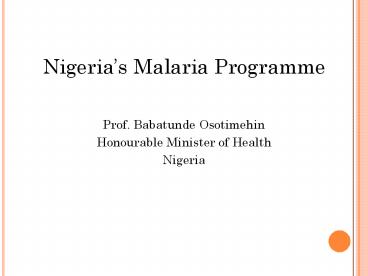Nigerias Malaria Programme - PowerPoint PPT Presentation
1 / 26
Title:
Nigerias Malaria Programme
Description:
Nigeria's Malaria Programme. Prof. Babatunde Osotimehin. Honourable Minister of Health ... Perfect the supply chain management of commodities. CONCLUSION ... – PowerPoint PPT presentation
Number of Views:113
Avg rating:3.0/5.0
Title: Nigerias Malaria Programme
1
- Nigerias Malaria Programme
- Prof. Babatunde Osotimehin
- Honourable Minister of Health
- Nigeria
2
Nigeria STRATEGIC IMPORTANCE
- Population
- Total 149,107,133
- Most populous country in Africa
- At risk 144,633,916
- U5s 29,821,426
- Preg. Women 7,940,134
- GNP USD582 (2005), income unequally distributed
- U5 mortality rate 201/1000 live births (NDHS,
2003) - Estimated 300,000 deaths per annum
3
HISTORICAL PERSPECTIVE TO MALARIA CONTROL
PROGRAMME
- 2000- Abuja Summit . African Union leaders
resolve to address malaria. - 2005- Roll Back Malaria (RBM) partnership was
established. - 2008- RBM was consolidated. Partners agreed to
the principle of the three ones - This has led to increased capacity for programme
management.
4
The Goal of Updated National Malaria Strategic
Plan
- The Goal of the National RBM Programme is to
reduce the malaria burden by half by the year
2010 - Overall Objectives
- To nationally Scale Up for Impact (SUFI)
- To sustain and consolidate these efforts in the
context of a strengthened health system and
create the basis for the future elimination of
malaria in the country
5
(No Transcript)
6
Institutional Arrangement for Malaria Control in
Nigeria Complex!!!
- NMCP
- Strategic functions
- Partners Forum
- Leverage Resources
- Technical Support
- Implement Activities
37 SMCP Operational Strategic functions
774 LGA MCP Operational functions
9,555 Wards Operational functions
- Stakeholders
- Manufacturers
- Commercial
- Consumers
- Interest Groups
Community Dev Committee
25m Households
7
- Current Status of Malaria Implementation
8
RBM PARTNERS
- Government of Nigeria
- The Global Fund
- The World Bank
- The UN System
- DFID
- USAID
9
CONTRIBUTION OF THE GOVERNMENT OF NIGERIA
- The Nigerian Government has given high political
commitment to the RBM partnership. - The government has also funded the malaria
control program from the MDG funds and debt
relief gains. - Government also signed a credit with the World
Bank to fund the National Malaria Programme.
10
PARTNERS CONTRIBUTION
- Partners have put financial and technical
resources into the RBM programme - G.F
- -provided over 4 million long lasting insecticide
treated nets (LLIN) - - 18 million Acetemin Based Combination
Therapy(ACT).
11
Malaria Commodities received from Government and
Partners (2006-2008)
12
ACHIEVMENTS OF PARTNERSHIP Commodities
Distributed (2006-2008)
13
- Attaining SUFI
- (Scaling Up for Impact)
14
Commodity needs to achieve SUFI (Scaling UP for
Impact)
15
Evidence of Existing Capacity to Implement
Scaling Up for Impact
- Government renewed effort to strengthen health
system, with Primary Health Care as arrowhead - Positioning the NMCP as well other related
disease control programs ATM Task Force with
Health Minister as Chair. - Integrating the NMCP with other relevant programs
such as Immunization, RH, - Supporting the Country Coordination Mechanism
(CCM) as well as RBM Partnership coordination
process - Public Private partnership e.g. with revised GF
grants implementation - Nigeria adopted the Three Ones principle
16
LLINs Campaigns
- Mapping
- Operational Guidelines developed
- LLINs Coordinating Committee formed
- Work Streams formed
- Logistics
- Technical
- Demand creation
- States support teams
- Timing of campaigns for the 36 States FCT
scheduled
17
Health Systems Strengthening
- Improving utilization of ANC services
- Recruiting and training community health workers
- Community systems strengthening
- Strengthen NHMIS
- Expand HR capacity
- Improving PSM
18
Other Implementation Enabling Factors
- There is steady progressive ownership,
commitment and allocation of resources by all the
three tiers of government, Federal, States and
Local governments. - RBM Partners both local and international will
provide assistance including technical, financial
and materials. - Monitoring and evaluation team will ensure
adequate programme performance framework is put
in place to assess the achievement of the
indicators of input, output, outcome and impact - The behavioral change and communications team
will mount adequate propaganda machineries that
will ensure positive health seeking behavioral
changes in the people
19
Possibilities for significant impact in malaria
control WHY ROUND 8 AND SUBSEQUENT ROUNDS SHOULD
BE FUNDED
20
(No Transcript)
21
- Funding Levels for Attaining SUFI
22
Summary of Estimated Programmatic Financial Gap
Analysis (USD) 2009-2010
23
Summary of Estimated Programmatic Financial Gap
Analysis (USD)
24
Reaching SUFI
- With current resources, it will take 14 yrs to
reach SUFI - With current resources R8 additional
resources - LLINs SUFI
2010 - ACTs SUFI
2011 - RDTs SUFI
2013 - IPTp SUFI
2011 - IRS
- HSS
- BCC, ME
25
AIDS, TUBERCULOSIS AND MALARIA, MODEL
- Nigeria has created a task team to work on the
three diseases. This is to - - Integrate the different response programmes
- Address the collective challenges
- Facilitate support to States
- Perfect the supply chain management of
commodities.
26
Conclusion
- With additional money of Rd 8, we will achieve
SUFI quicker and save more lives with your help. - Even in the future, there is need for predictable
funding for sustaining the gains and move towards
elimination and eventually eradication.































